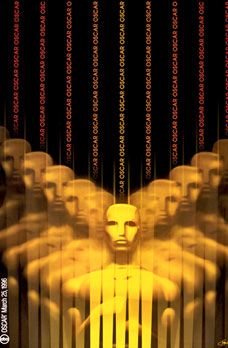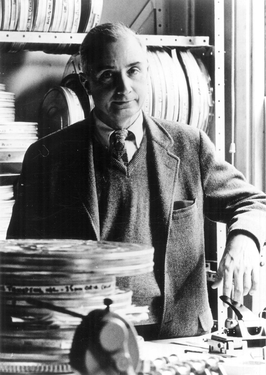Related Research Articles
The Academy Awards, commonly known as the Oscars, are awards for artistic and technical merit for the film industry. They are presented annually by the Academy of Motion Picture Arts and Sciences (AMPAS) in the United States in recognition of excellence in cinematic achievements as assessed by the Academy's voting membership. The Oscars are widely considered to be the most prestigious awards in the film industry.

The Toronto International Film Festival is one of the most prestigious and largest publicly attended film festivals in the world. Founded in 1976, the festival takes place every year in early September. The organization behind the film festival is also a permanent destination for film culture operating out of the TIFF Lightbox cultural centre, located in Downtown Toronto.
This is a list of films by year that have received an Academy Award together with the other nominations for best documentary short film. Following the Academy's practice, the year listed for each film is the year of release: the awards are announced and presented early in the following year. Copies of every winning film are held by the Academy Film Archive. Fifteen films are shortlisted before nominations are announced.
A roadshow theatrical release or reserved seat engagement is the practice of opening a film in a limited number of theaters in major cities for a specific period of time before the wide release of the film. Roadshows would generally mimic a live theatre production, with an upscale atmosphere as well as somewhat higher prices than during a wide release. They were commonly used to promote major films from the 1920s–60s and build excitement.
The Calgary International Film Festival (CIFF) is a film festival held annually in Calgary, Alberta, in late September and early October.
The Canadian Film Awards were the leading Canadian cinema awards from 1949 until 1978. These honours were conducted annually, except in 1974 when a number of Quebec directors withdrew their participation and prompted a cancellation. In the 1970s they were also sometimes known as the Etrog Awards for sculptor Sorel Etrog, who designed the statuette.

The 68th Academy Awards ceremony, organized by the Academy of Motion Picture Arts and Sciences (AMPAS), honored the best films of 1995 in the United States and took place on March 25, 1996, at the Dorothy Chandler Pavilion in Los Angeles beginning at 6:00 p.m. PST / 9:00 p.m. EST. During the ceremony, AMPAS presented Academy Awards in 24 categories. The ceremony, televised in the United States by ABC, was produced by David Salzman and Quincy Jones and directed by Jeff Margolis. Actress Whoopi Goldberg hosted the show for the second time, having previously presided over the 66th ceremony in 1994. Three weeks earlier, in a ceremony held at the Regent Beverly Wilshire Hotel in Beverly Hills, California, on March 2, the Academy Awards for Technical Achievement were presented by host Richard Dreyfuss.

The 42nd Academy Awards were presented April 7, 1970, at the Dorothy Chandler Pavilion in Los Angeles, California. For the second year in a row, there was no official host. This was the first Academy Awards ceremony to be broadcast via satellite to an international audience, though outside North America, Mexico and Brazil were the only countries to broadcast the event live.

Alexandr Hackenschmied, born Alexander Siegfried George Hackenschmied, known later as Alexander Hammid, was a Czech-American photographer, film director, cinematographer and film editor. He immigrated to the U.S. in 1938 and became involved in American avant-garde cinema. He is best known for three films: Crisis (1939), Meshes of the Afternoon (1943) and To Be Alive! (1964). He made Meshes of the Afternoon with Maya Deren, to whom he was married from 1942 to 1947. His second marriage was to the photographer Hella Heyman, who had also collaborated with Hammid and Deren on several films.
The Hot Docs Canadian International Documentary Festival is the largest documentary festival in North America. The event takes place annually in Toronto, Ontario, Canada. The 27th edition of the festival took place online throughout May and June 2020. In addition to the annual festival, Hot Docs owns and operates the Hot Docs Ted Rogers Cinema, administers multiple production funds, and runs year-round screening programs including Doc Soup and Hot Docs Showcase.
The Boulder International Film Festival (BIFF) is held annually in March in Boulder, Colorado. BIFF features films by new and emerging filmmakers, as well as industry directors, writers, producers, and actors. There are 25,000 attendances annually.
Sentinels of Silence is a 1971 short documentary film on ancient Mexican civilizations. The film was produced by Manuel Arango, and directed and written by the filmmaker Robert Amram, and is notable for being the first and only short film to win two Academy Awards.
The Kerry Film Festival is an annual film festival that takes place in County Kerry, Republic of Ireland, during October / November. The Kerry Film Festival is funded by Kerry County Council, Fáilte Ireland, the Arts Council as well as having corporate sponsorship.

The Canadian Screen Awards are awards given for artistic and technical merit in the film industry recognizing excellence in Canadian film, English-language television, and digital media productions. Given annually by the Academy of Canadian Cinema & Television, the awards recognize excellence in cinematic achievements, as assessed by the Academy's voting membership.

The Golden Rondelle Theater is a historic theater currently located in the administration complex of S. C. Johnson & Son in Racine, Wisconsin. Featuring a radical design, the theater was originally part of the 1964-65 World's Fair before being moved to Racine. At the World's Fair the theater was used to show the award-winning film To Be Alive!. After the fair, the theater was dismantled, shipped to Racine, and used as the basis of a re-designed theater. The design work was by Taliesin Associated Architects, a firm founded by apprentices of Frank Lloyd Wright.
Doc NYC is an annual documentary film festival in New York City. Co-founded by Thom Powers and Raphaela Neihausen, the festival is the country's largest documentary film festival with over 300 films and events and 250 special guests. By 2014, DOC NYC had become America's largest documentary film festival and voted by MovieMaker magazine as one of the "top five coolest documentary film festivals in the world". The festival takes place over 9 days in November at the West Village's IFC Center, Village East by Angelika, and SVA Theater.
The Genie Award for Best Theatrical Short Film was a Canadian film award, historically presented by the Academy of Canadian Cinema and Television through its Genie Awards program to a film judged as the year's best short film. The award has been inclusive of short films in the live action drama, animated and documentary genres.
John Wadsworth Barnes was an American film director and producer. He was most active in the educational film industry, producing, directing and writing for Encyclopædia Britannica Films. In his career he worked on and helped create over 100 film projects. He produced the Academy Award nominated documentary The Living City. He wrote for a radio drama series, made experimental Bolex films, and produced the film To Live Together.

E. Francis Thompson was an American director, producer, and writer known for his multi-screen and giant-screen filmography.
The 9thannualCanadian Screen Awards were held in the week of May 17 to 20, 2021, to honour achievements in Canadian film, television, and digital media production in 2020.
References
- ↑ "The 38th Academy Awards (1966) Nominees and Winners". oscars.org. Retrieved May 5, 2016.
- ↑ "Time: The World of Already". Time. June 5, 1964. Archived from the original on May 14, 2009. Retrieved May 26, 2008.
- ↑ New York Times obituary of Alexander Hamid
- ↑ To Be Alive! (the book version)
- ↑ Hall, Phil, The New PR. 2007, Larstan Publishing. ISBN 0978918207
- ↑ Alternative Film Scene
- ↑ Academy Award database Archived July 1, 2012, at archive.today
- ↑ "The Golden Rondelle". Archived from the original on August 28, 2008. Retrieved May 26, 2008.